
Military hospital dials in virtual healthcare to combat COVID-19
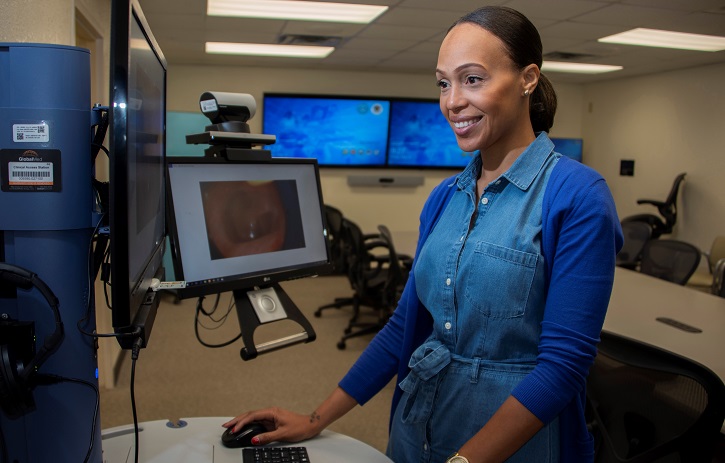
Zekelia Rembert, virtual health nurse care coordinator, reviews patient photos using the virtual health cart at the Virtual Medical Center at Brooke Army Medical Center, Fort Sam Houston, Texas, May 10, 2019. The team at the Virtual Health Center at Brooke Army Medical Center and Regional Health Command - Central has been selected as the 2018 U.S. Army Medical Department Mercury Award winner for Health Information Technology Team of the Year. (U.S. Army photo by Jason W. Edwards)
JOINT BASE SAN ANTONIO-FORT SAM HOUSTON, Texas, April 8, 2020 – Deb Deja’s follow-up visit with her provider at Brooke Army Medical Center was fast approaching when COVID-19 hit the news and the city. With a citywide stay-home order in place but pressing questions for her doctor, Deja became concerned by the thought of holding off on the appointment until a later date.
When the call came to offer her a virtual appointment instead, Deja jumped at the opportunity. “I was very happy to do it,” she said. “My trip each way is 30 to 45 minutes so it was very convenient.”
Her three-month follow up took place last week via phone. “The initial contact person asked all the questions just as if I was there in person and my doctor answered all of my questions completely,” Deja said. “I wouldn’t hesitate to participate in a virtual appointment again.”
Virtual medicine is a globally burgeoning field that’s exploded in recent weeks due to COVID-19 spread concerns and stay-at-home city and state orders. At BAMC, traditional face-to-face appointments for most routine care have increasingly shifted to virtual care to ensure social distancing as well as patient and provider safety.
Reducing COVID Exposure
BAMC has been leveraging every virtual asset to its fullest extent over the past month, starting with the San Antonio Military Health System COVID-19 Nurse Information Line, where nurses administer an initial COVID screening, and the Central Appointment Management Office, which offers telemedicine appointments for primary care needs.
“These avenues are really the foundation in connecting with people,” said Army Col. Timothy Switaj, chief, BAMC Department of Family and Community Medicine. “The majority of our conversation is spent actively listening to our patients while taking a thorough medical history.”
Virtual appointments can be used for medication refill requests, lab and radiology results, cold and allergy symptoms, urinary tract infections and routine follow-up appointments in which a physical exam isn’t required.
In some cases, the doctor may determine face-to-face care is necessary and will immediately shift the appointment back to in-person. “We always keep patient safety in focus,” Switaj said.
Virtual appointments have proven beneficial on several fronts. “They are not only a hit with patients who enjoy the convenience of an at-home appointment, but it affords staff an additional platform to care for our patients’ needs in a timely and efficient way, thus improving overall access to care,” Switaj said.
“This gives staff more time to proactively manage patients and their health, especially focusing on preventive care,” he added.
Critical Capability
The shift to virtual healthcare is one the Military Health System has been anticipating for several years. Two years ago, BAMC became an innovation focal point with the launch of the military’s first Virtual Medical Center. The center’s intent is to serve as a testbed for new capabilities and a centralized program structure to advise and oversee global virtual health efforts.
Since that time, virtual health has proven invaluable in supporting troops on the battlefield with real-time health assessments, preventing lengthy trips to other locations for routine or certain types of specialty care, such as dermatology, explained Army Lt. Col. Sean Hipp, director, Virtual Medical Center. BAMC providers and specialists also serve in a virtual advisory capacity to their counterparts downrange.
Additionally, the center’s Mobile Medic program educates medics around the world, enabling them to conduct medical assessments in the field while communicating with a health care provider via video conferencing.
“By doing so, we are saving time and resources vital to our wartime and humanitarian efforts,” Hipp noted. “This capability will be increasingly critical to ensure that service members will survive war wounds and make it home.”
Future Innovation
While the majority of BAMC’s virtual appointments are conducted via telephone at this point, Hipp sees a tremendous future application for video-based platforms. “Just one example is a virtual lactation consult,” he noted. “Our experts can use video to teach new parents how to latch in the comfort of their own home.”
While video would be a welcome asset, the challenge has been in developing a virtual platform that’s able to be integrated with government software and electronic health records. This type of secure platform is still being researched, Hipp noted.
“Ideally, it will be a seamless product, transferring data between virtual and in-person appointments, while also transitioning data to the VA,” he said.
In the meantime, Hipp is exploring the expansion of telecritical support, noting the success of the Joint Critical Care Network in San Diego. This network of providers and other specialists monitor smaller wards in facilities throughout the military, providing overwatch and support for patients in intensive care units. With COVID-19, there’s a feasible telecritical application at BAMC.
“We are looking into the possibility of installing cameras and central monitoring equipment for wards in which COVID patients are being cared for,” Hipp said. “Critical care providers are a finite resource and having this capability would enable them to provide invaluable care to a greater number of patients.”
The long-term vision is to have providers centrally view the platform from home or another site, he added.
Redefining Delivery of Care
Hipp is hoping the current virtual trend will lead to lasting benefits.
“On the readiness side, we already have a robust readiness clinic and the ability to see patients all over the world rapidly. Now, we are gaining a better understanding of what can be done over the phone or on video, which will lead to better access to care throughout the San Antonio Military Health System,” he said.
For BAMC’s patients, one of the key benefits has been the ability to stay safe at home. Barb Mahoney’s husband, Pat, had a telehealth visit last week, which also saved the couple two hours in travel time. “It went very well,” she wrote in a BAMC Facebook comment.
Deja said her doctor reassured her several times during the call to call the clinic if she needed further guidance.
“I didn’t feel this pandemic stopped my care; it just changed the process,” she said.
As for the future, “This could potentially redefine how we deliver primary care,” Switaj said.
To inquire about a virtual appointment for non-urgent care, beneficiaries should call the Consult Appointment Management Office at 210-916-9900. For COVID-related questions, call the SAMHS COVID-19 Nurse Info Line at 210-581-2266, option 6. The advice line is available Monday-Friday from 7 a.m.-7 p.m. and weekends from 10 a.m.-4 p.m. After hours, please call the MHS Nurse Advice Line at 1-800-TRICARE (874-2273), option 1. For medical emergencies, please call 911.
Stay Home Slide Show
Video
4/10/2020
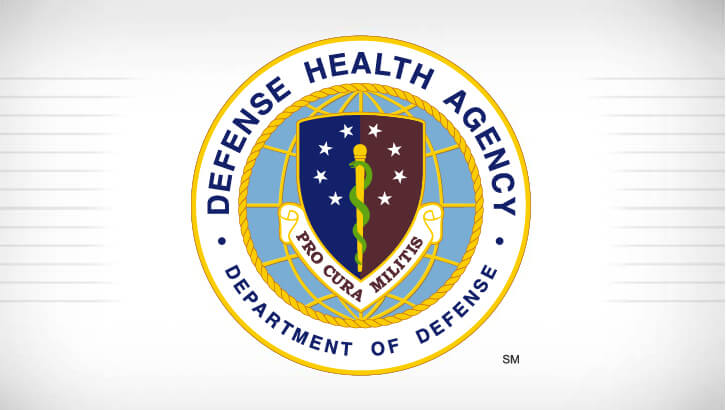
Slide show of photos from BAMC's #stayhome campaign
inTransition Teams Up with the Veterans Crisis Line to Support Service Members in Crisis
Article
4/10/2020
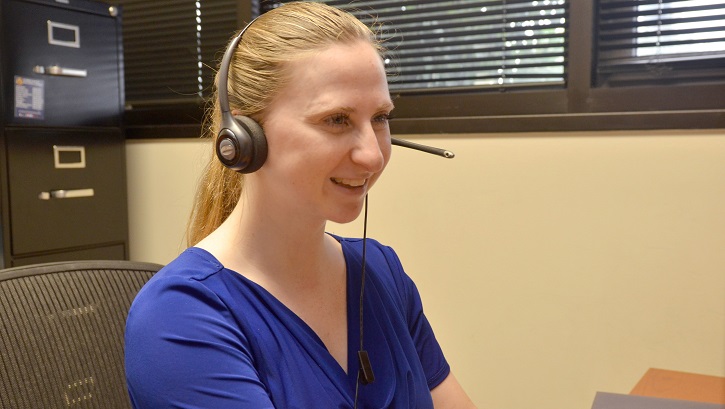
In response to an increased volume of calls to the Veterans Crisis Line (VCL) since the outbreak of the novel coronavirus (COVID-19), inTransition is partnering with the VCL to coordinate certain types of care for active duty service members.
Army Corps Launches Alternate Care Facility Construction
Article
4/10/2020
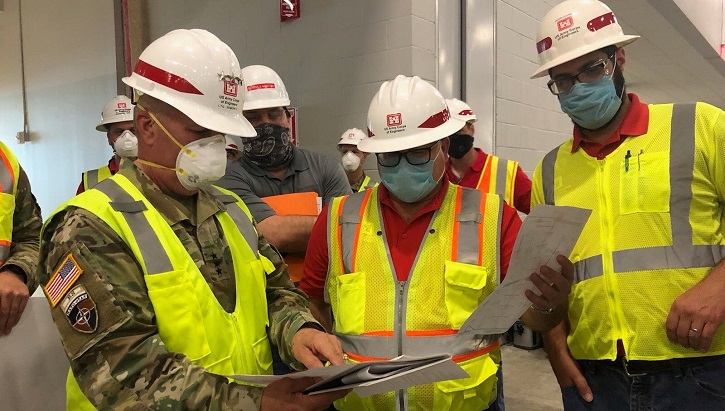
Building health care facilities isn’t a new task for USACE, which has years of experience designing and building hospitals and clinics for the military health system.
Guardsmen Remain Adaptable in Face of Coronavirus
Article
4/9/2020
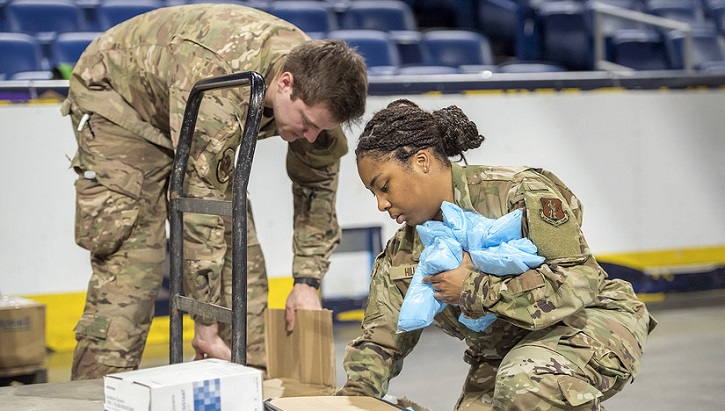
More than 28,000 National Guardsmen are helping to fight the coronavirus across America
Authorization to Employ Military Medical Capabilities to Treat COVID-19 Patients
Publication
4/8/2020
Effective immediately, the Commander, U.S Northern Command, is authorized, as he deems necessary and appropriate, to employ military medical capabilities under his operational control to treat patients who have contracted coronavirus disease 2019 (COVID-19).
Defense Health Official Urges Personnel, Families to Wear Face Masks
Article
4/8/2020
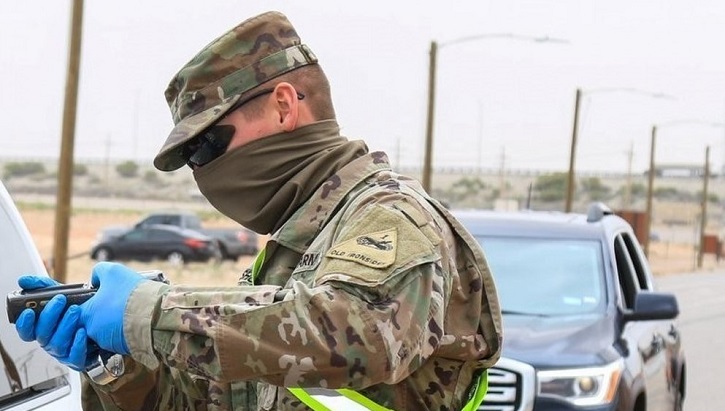
The face-covering mask can be fashioned from simple household items.
Talking to children about COVID-19 helps them feel safe and secure
Article
4/8/2020
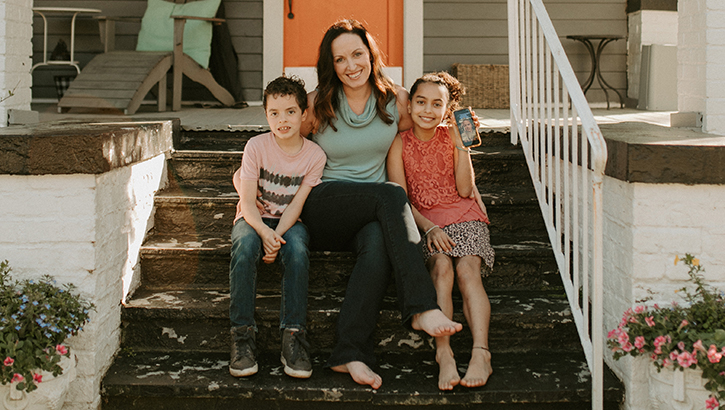
USU expert advises tailoring messages for different age groups
VENDOR UNSOLICITED PROPOSAL IN SUPPORT OF COVID-19
Form/Template
4/7/2020
Unsolicited Proposal Information Supporting COVID-19
Decision Memorandum on TRICARE Implementation of the "Families First Coronavirus Response Act"
Publication
4/7/2020
The Families First Coronavirus Response Act, Public Law 116-127, Division F, Section 6006(a), limits TRICARE authority to impose copayment or other cost-sharing for novel coronavirus (COVID-19) testing and related provider visits that result in orders for or administration of Food and Drug Administration (FDA) approved, cleared, or authorized diagnostic products. In order for the Defense Health Agency (DHA) to implement, the Assistant Secretary of Defense for Health Affairs (ASD(HA)) must acknowledge the self-executing authority of the statute and direct the Director, DHA, or designee, to issue guidance implementing the statutory provisions.
Joint Staff Surgeon Praises Americans Stepping Up to Help COVID-19 Victims
Article
4/7/2020
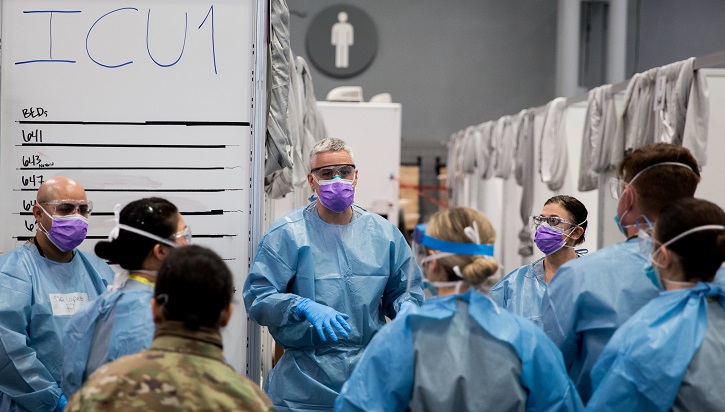
It's about people helping people, flattening the curve, and slowing the spread of the pandemic so hospitals have a bit more time to prepare.
New York City emergency room doc joins Air National Guard as flight surgeon
Article
4/6/2020
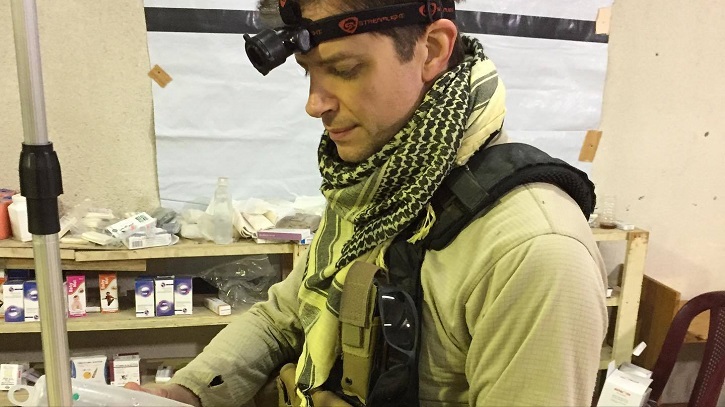
Paladino is Associate Professor of Emergency Medicine at SUNY Downstate Medical Center and also at Kings County Hospital Center.
DoD Guidance on the Use of Cloth Face Coverings
Publication
4/5/2020
Effective immediately, to the extent practical, all individuals on DoD property, installations, and facilities will wear cloth face coverings when they cannot maintain six feet of social distance in public areas or work centers (this does not include in a Service member's or Service family member's personal residence on a military installation).
Policy on Accessions and Accessions Training during the COVID-19 Outbreak
Publication
4/3/2020
The Military Departments must seek ways to maximize accessions in a responsible manner to minimize a reduction in military end strength and the potential deterioration of mid-and long-term readiness and capacity.
It’s complicated: Our relationship with social media
Article
4/3/2020
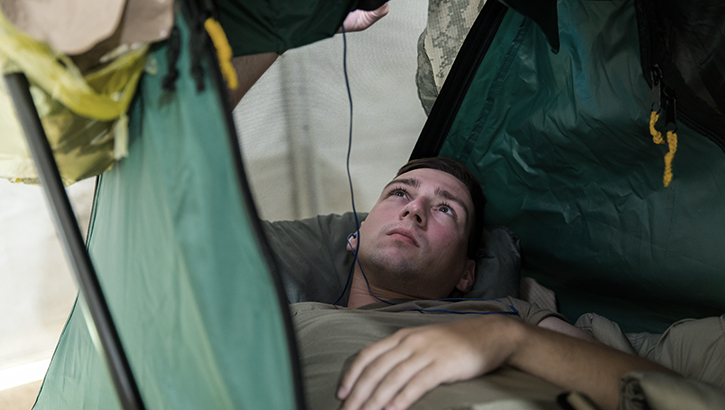
COVID-related story on perils of social media
250-patient Army field hospital in Seattle expected to open next week
Article
4/3/2020
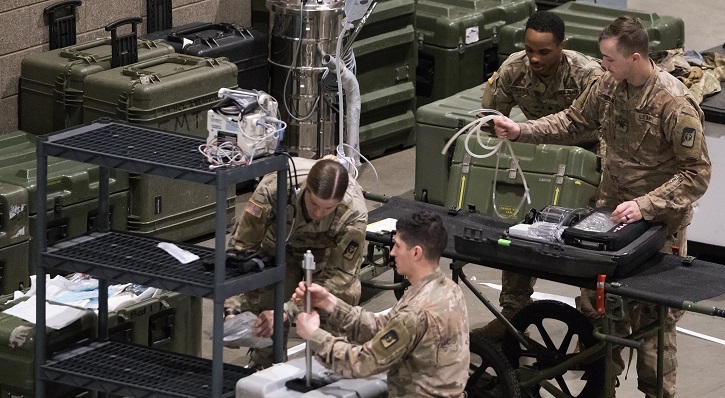
The field hospital...will relieve some of the burden on local hospitals, allowing them "freedom of maneuver" to better take care of patients who have COVID-19































No hay comentarios:
Publicar un comentario